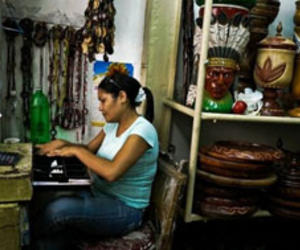Cubans enticed bewildered by economic-opening
- Submitted by: manso
- Business and Economy
- 01 / 23 / 2011

HAVANA (AFP) - Milagros, a typist, wants to know if she is allowed to use a computer or only her old typewriter, and Lazaro wonders whether the law will stop him from advertising the sale of cult candles and necklaces.
As private enterprise bubbles up in Cuba after decades of official disfavor, Cubans have a million questions about how far they can go under the economic reforms being pushed by President Raul Castro, the first such overhaul in 14 years.
"There is bewilderment -- a lot of people have the desire to act and not much knowledge of the new laws, because there were a lot of restrictions before," said Lazaro Mendez, who has been in business for himself for 26 years.
"I worked alone because I wasn't allowed to have assistants," he added.
Mendez is surrounded by the herbs, mortars and bowls in a store where he sells paraphernalia used in Santeria, the syncretic Afro-Cuban cult that blends Yoruba religious beliefs and Christianity.
At the entrance to his shop, strategically located in the populous Cuatro Caminos neighborhood, one of his 10 employees is barking into a megaphone: "Candles for 3.50, necklaces for 10. Compare prices and see!"
Next door, in a store five times smaller, Miriam Velazquez complains: "I don't understand this, he can use a megaphone, but the sector (police) chief won't let me play religious music as mood music. They'll take away the license I just took out to earn a living."
What's allowed and what isn't? The confusion is so great that state-run Radio Rebelde recently turned over its microphones to Labor Ministry experts for several days to take questions from the public.
Hilda called from Camaguez for guidance on what she can and can't sell in her snack shop. Maribel, a teacher from Granma, asks if she has to get permission from her school to moonlight selling sweets. Adrian from Holguin wants to know if he can let a sales assistant work alone in his shoe store from time to time.
Despite the uncertainties, doubts and risks, 85,000 people have requested business permits since Castro authorized private ventures in 178 fields as an option for the 500,000 Cubans who face being laid off from the bloated state bureaucracy.
But old habits die hard.
In the licensing offices, government bureaucrats still ask for the burdensome paperwork once required of the few people given permission to go into business for themselves.
So officials have taken to repeating over and over again to the public: "Two photos and an identity card. Nothing else!"
Restaurants still produce menus that list only a fraction of the available dishes, a practice born from evading past prohibitions on serving certain prohibited items, like meat.
And their caution is not gratuitous.
Small businesses were abolished in 1968 and only allowed back in 1993 to ease the economic crisis that swept Cuba after the collapse of the Soviet Union.
The government backpedaled in 2004, and many Cubans who went into business for themselves wound up giving up because of the onerous bureaucratic controls.
In pushing the latest wave of reform, Castro acknowledges that the times call for a change of mentality.
"We must defend the interest of those who work on their own account, just as we do any other citizen," he said in a speech in December. "Erroneous and unsustainable concepts about socialism have to be transformed."
At the same time, however, he warned that "the concentration of wealth will not be allowed."
But Lazaro Mendez is undaunted. He has big plans for the entryway of his shop, where he exhibits images of Yoruba deities.
Not satisfied with just a megaphone, he is getting ready to do something that until now has been prohibited in Cuba -- hang a sign that advertises: "Herbalist of 4 Caminos. Religious articles."
Source: http://nz.entertainment.yahoo.com/news/article/-/8698194/
Comments